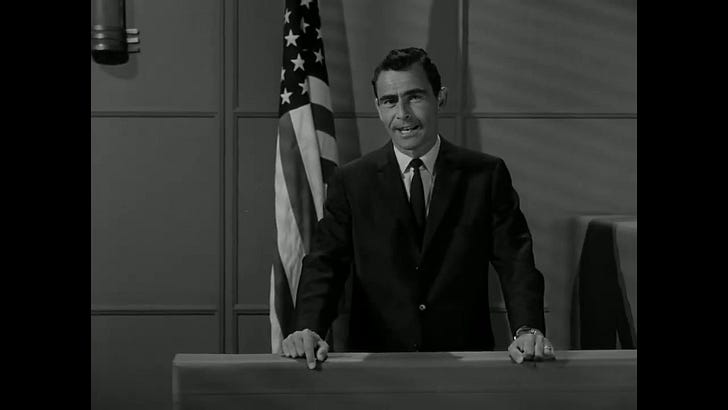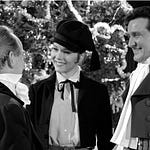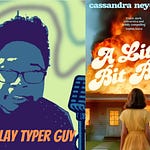My friend Raven Snook is a writer, editor, performer, mom and all-around diva (in the positive sense of the word) who’s currently the Editor of Creative Content for TDF and a contributing theater critic for Time Out New York. She joins me to discuss this year’s Tony Awards and the post-pandemic state of theatre.
Raven’s work has also appeared in New York Magazine, Yahoo Parenting, the New York Post, The Village Voice, Bon Appétit, Better Homes & Gardens and Parents.com, among others.
Download the podcast above and listen at your leisure. You can also watch the YouTube version below. Please like, share, subscribe and all the rest.
Transcribed excerpts from our conversation …
SER: This is airing before the Tony Awards, and I’m curious what your thoughts are on the past season?
RAVEN SNOOK: You know, the Broadway season specifically was interesting in that there were so many new musicals. There were 39 new productions in all. And I think there were like 21 new musicals. I'd have to check my stats, but there were a lot … 21 musicals altogether, revivals and new musicals. So there was so much excitement around the musicals, especially this spring when most of the new ones opened, but it turned out that generally the new musicals have not been as interesting this year as the new plays. The plays have really been the thing.
And I don't just mean in terms of reviews, but even in terms of selling out. Stereophonic, which is David Adjmi’s Broadway debut — he’s a playwright who’s been working a lot off-Broadway and regionally for years. We went to college together, although we didn’t really know each other then. We know each other much more now socially through the Facebooks and such. That show, Stereophonic, transferred from Playwrights Horizons after some of the best reviews I’d seen in years for a show.
It’s a three-hour, 15-minute play about a ‘70s band making their seminal album and fighting through it. Yes, shades of Fleetwood Mac’s Rumors, which I knew nothing about until I saw this play, to be honest, but it’s not a docudrama. He uses that as a jumping off point. That is a play that I think is a shoo-in to win the Tony Award.
It has the most Tony nominations of any play ever, 13. Five of its seven-member cast have been nominated, which has been really interesting because I feel like they’re going to cancel each other out. And I’m begging the Tony Awards to institute a Best Ensemble award because every year we end up with shows where they’re sort of roles of equal weight and either everybody gets nominated or nobody gets nominated. Nobody ends up winning.
Another play that has done very well, [Appropriate] … it’s written by a playwright I’ve interviewed and I love, Branden Jacobs-Jenkins. And it was off Broadway about a decade ago. It got very mixed reviews, but then ended up winning the Obie and getting produced a lot regionally.
In its Broadway debut, the reviews were not only incredible, but Jesse Green in the New York Times actually said that his poor review of the play 10 years before for New York Magazine, that he was wrong, that either he was wrong or that things have changed.
This is a new production, new director, new actors, so it is different than it was 10 years ago, but it has not been extensively rewritten. And it’s another one that's been like a sellout.
It was produced on Broadway by Second Stage at their Broadway house, which is the Hayes, the smallest Broadway house. And you couldn’t get a ticket. Tickets were like $700. Then it was such a big deal that it was transferred for a limited run commercially to a bigger theater. And even there, you still can’t get a ticket. It’s got Sarah Paulson. So, you know, she is a big star and Corey Stoll. They’re really giving the stage performances of their lives. I think Paulson is probably a shoo-in to win the Tony for Best Actress in a Play award. Unless Jessica Lange sneaks up on her.
Mother Play by Paula Vogel, who’s a Pulitzer Prize-winning playwright. Most people know her because of How I Learned to Drive, which was the Pulitzer Prize winner, but she’s written many wonderful, great plays.
Mother Play is autobiographical and about her relationship and her late brother’s relationship with their very dysfunctional mother, played by Jessica Lange.
Again, sellout. Can’t get a ticket. Everybody wants to see it. I’m sort of depressed at how much I related to this horrible mother in some ways, but it’s a testament to the writing that Vogel, you know, [Lange’s character] is a terrible mother, but you kind of understand why and have sympathy for her. And there’s a 12-minute sequence where Jessica Lange’s alone on stage and doesn’t say anything and she’s just like getting ready for dinner and making a TV dinner and it’s an absolutely captivating sequence … something I’ll never forget from this year of theater.
Sometimes life is not a Cabaret
SER: I presume you saw the new Cabaret?
RAVEN: I did.
SER: I was watching a documentary recently that covered how the [Liza] Minnelli movie was sort of groundbreaking at the time.
It’s not just that it’s a great story, it’s actually doing things that were sort of risky and dangerous. So when you bring something back and it’s not as risky and dangerous, I don’t know. And I love Bebe Neuwirth and I was still kind of like, I don’t know.
RAVEN: She is phenomenal.
I will say this. I hated it. I thought most people were terrible in it. But I think every single person was doing exactly what [the director] wanted them to do. I don’t think they were bad because they were miscast. I don’t think they were bad because they’re untalented. Every single actor on that stage I’ve seen do incredible work before.
Eddie Redmayne, I saw him win his Tony for Red. Addo Blanks and Wood is consistently wonderful in plays and musicals. And Gail Rankin, I know her more from TV, but she had done the last production of Cabaret. She played Fraulein Kost, and she was quite good as Fraulein Kost. I just think that the director’s understanding of it is fundamentally wrong. You know, I’m sure she would say I’m wrong.
There’s a whole pre-show. They’ve redone the theatre. So you’re walking around through this sort of immersive, decadent atmosphere as various performers, not people who are in the show, but people they’ve hired for the pre-show are performing. It felt like the worst bridge and tunnel club I’d ever been to.
I understand that the concept is, it’s lulling you into being seduced by Weimar Berlin, right? It just seemed to be a money grab to me.
Cabaret is about how Weimar Berlin was outrageous and seductive. And, you know, I guess for some people, you know, for conservative people, morally terrifying. And that's how the Nazis helped the Nazis rise, right? They weren’t just scapegoating Jews. And to be fair, there were lots of people in the camps. They scapegoated lots of people, not just my people. It’s such a perfect time for Cabaret because look at how the Right is [claiming] the Democrats are grooming children to be gay. Oh, you know, the trans kids are trying to like get into your kid's bathroom to do things. Look how they’re using social progress …
What people have said is that this is a Cabaret that wears its subtext where the Nazi band should go. From the minute that Eddie Redmayne comes out and he’s the MC, there’s nothing sexy. There’s nothing fun. There’s nothing seductive. It’s just literally he’s like a Nazi from moment “Go.” He’s scary and off putting and awful from moment “Go.”
That makes no sense because if we don’t understand why people were sort of immersed in this world and in a way, it almost is sort of judgy of the people who were part of Weimar Berlin, at least to me.
Theatre post-pandemic
SER: How have things changed for people trying to access theatre now?
RAVEN: My day job is at TDF. I’m the editor of creative content and we sell discount tickets through our membership program, TDF, as well as the TKTS booth, which is our most public- facing program and the one that like most people know.
When a show’s a hit, like The Outsiders, for example … it’s done very, very well, despite sort of lukewarm reviews … it’s dynamic pricing. They just put the ticket prices as high as they can. So any discounts they give are minimal or, end up being like what you could have gotten if you bought in advance at the box office.
So, you know, for hits, it’s still really hard to get tickets. Merrily We Roll Along, Appropriate, especially when it was in the smaller venue, Stereophonic. The hits are commanding high prices.
But generally off-Broadway, the nonprofits, like even if they’re selling out, they’re not commanding huge ticket prices. They’re limited runs. There was a Suzan-Lori Parks play called Sally and Tom, which is exactly what you think it’s about, and I don’t think that they were discounting tickets, but they weren’t commanding huge prices either.
I think what’s been more of a crapshoot is, you know, the off-off Broadway scene. You know, on the one hand, a lot of those companies, most of them don’t have a brick and mortar home to have to pay for. They just pay for their productions. But then they have to book, you know, rent a theater. Then they have to get people in to come see it. You know, if they don’t have like a regular season, they're only doing one show a season or maybe two.
And then there’s been a lot of cutbacks in grants. I’ve noticed a lot of people I know who run off-off-Broadway nonprofits saying they didn’t get the grants that they usually get, the ones they count on, that they assume they’ll get every year.
So, I mean, look, it is a crisis. The nonprofits that have subscription seasons know that subscriptions just don’t really do it anymore. So that’s got to shift. And then they also have to realize that the grant money is not a given and that people [who] are giving grant money, when you have people with deep pockets, donations are going to things like homelessness, the migrant crisis, places where people want to make a social impact. So theatre kind of has to rethink — it’s easy to say, right? — but it needs to rethink its financial model.
Don’t worry, we end on an upbeat note! Watch below.












